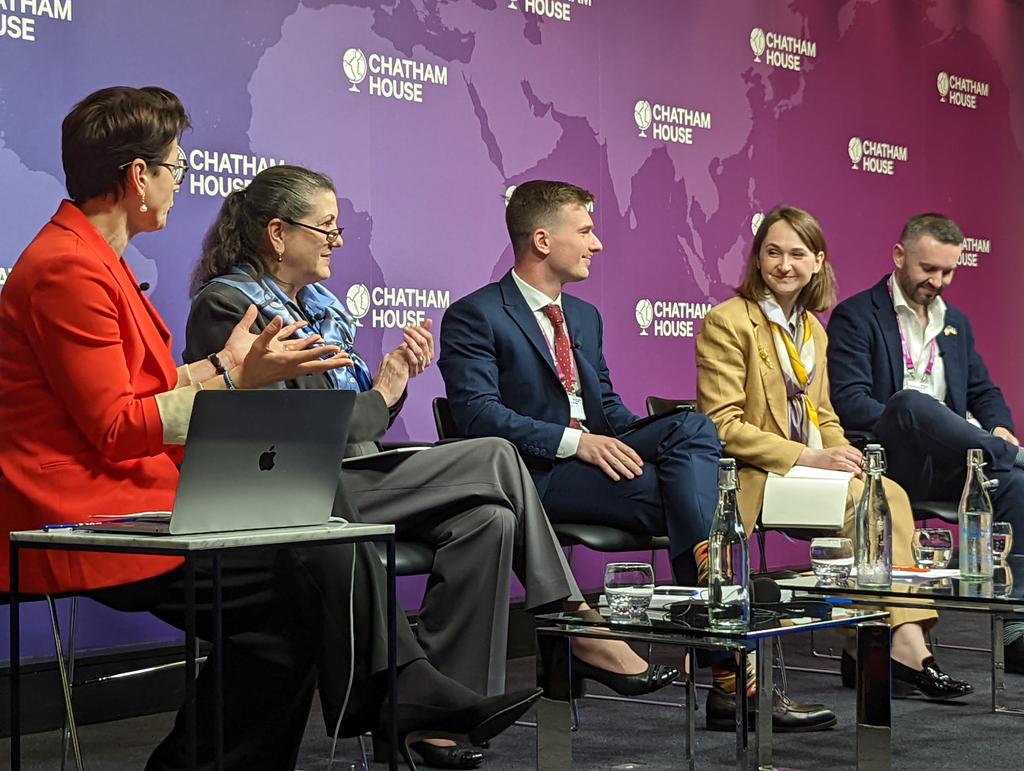
This is the speech of Cedos’ director Ivan Verbytskyi at the event “Shaping the new Ukraine: Delivering resilient recovery” on June 20th 2023 at Chatham House. This was a side event of the Ukraine Recovery Conference in London. The participants offered new understanding and approaches to recovery and discussed specific mechanisms for the sustainable, inclusive and transparent reconstruction of Ukraine.
Let me start with the question of why exactly we need democracy and the participation of civil society in the recovery process in general.
My answer is that an undemocratic Ukraine would be, among others, a security threat to Europe. So preservation of Ukraine`s democracy will benefit not only the Ukrainian people but wider regional stability as well.
There are so many talks about what democratic recovery means. But I want to flip this discussion a little bit. Let`s think from the opposite. What may one recommend for Ukraine to become undemocratic? My best answer is social and economic inequality — the feeling inside significant social groups that they are left behind. This relative deprivation may lead to the rise of political populism and radicalisation.
We all know the beautiful motto ‘Leave no one behind’. But what does it actually mean? In housing, this is affordability and a system of low-profit and not-for-profit housing that is nearly inexisting now in Ukraine. In educational policy, this means fighting learning losses and inequalities in access to good-quality education for children from low-income and rural households. In social policy, this means workplace creation and better working conditions for the key workers.
Sometimes in Ukraine, we hear some voices advocating for the abolition of state-funded education or the complete deregulation of everything. I would argue that Leave no one behind is the opposite of such ideas.
To sustain our democracy, we need to avoid deep social inequalities, and precisely for this goal, we need civil society.
What tools are needed for civil society to participate in the recovery? Of course, there is a list. The law on public consultations and strengthening the framework for public participation in recovery planning at the local level, strengthening the role of local communities in urban planning and construction (I mean something opposite to the 5655 draft law), as well as more funding for local authorities to conduct participatory practices. But my answer is that the lack of tools is not the main issue. We have more tools for public participation than many other countries. What we need to improve the most is how we use or not use existing tools.
Civil society organisations can help precisely with this. By representing the different needs of different social groups, NGOs and grassroots may ensure social and economic inclusion and avoid the feeling of being left behind.
For example, social dialogue is needed. It is precisely workers who will rebuild Ukraine with their hands. Social dialogue is an important value for the European way of policy-making in general and a good lesson from the European recovery after the Second World War. But I am not sure whether we have many union representatives at the Ukraine Recovery Conference.
Persons with disabilities, workers, Romani people, tenants, homeless, elderly, Crimean Tatars, youth, veterans, LGBTQ+, IDPs, different local communities and so on and so on. Civil society organisations represent the needs of all these social groups. Their participation in the decision-making takes time, needs financial resources, and the strengthening of the capacity of public authorities to conduct research, properly work on all stages of the policy cycle with public participation, and implement decisions made together.
This may not produce such a wow effect that might be created by another new IT tool. But the core institutional funding, not only short-term project-based funding, is crucially needed for Ukrainian civil society to preserve our democratic development.
I want to share with you several examples of our own activities.
Now Cedos is working on the assessment of the social impact of the full-scale Russian invasion on the vulnerable social groups in Ukraine for the World Bank. This is aimed to complement the Rapid Damage and Needs Assessment, which focuses on the financial side of the damage, with its human perspective.
We also work on a policy level with educational, social and housing policies. In the latter, for example, our focus is developing a new housing model for Ukraine to create sustainable instruments of affordable housing provision. Our Ukrainian Urban Forum is aimed at discussing these policies on different levels.
We assist a number of local municipalities in their strategic and recovery planning to do it in the most participative way possible because local democracy is the cornerstone of the democratic culture. Also, with our partners, we plan to work closely with municipalities and local civil society organisations to assist them in creating community centres as public spaces for dialogue on the ground.
I do believe that our ability to listen to others is the crucial element making us a democracy and a society in general. So thank you for listening to me, and thank you for supporting Ukraine!
Support Cedos
During the war in Ukraine, we collect and analyse data on its impact on Ukrainian society, especially housing, education, social protection, and migration










